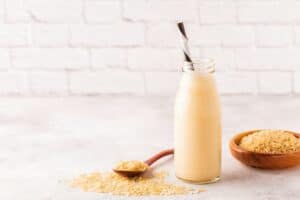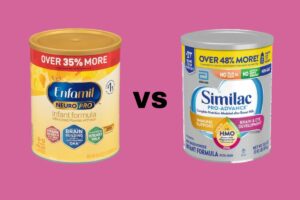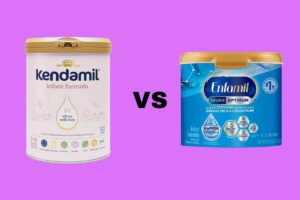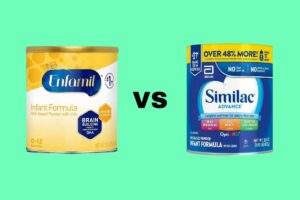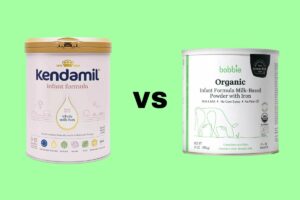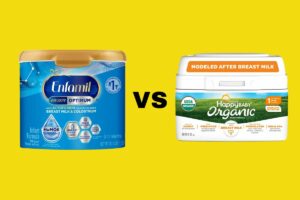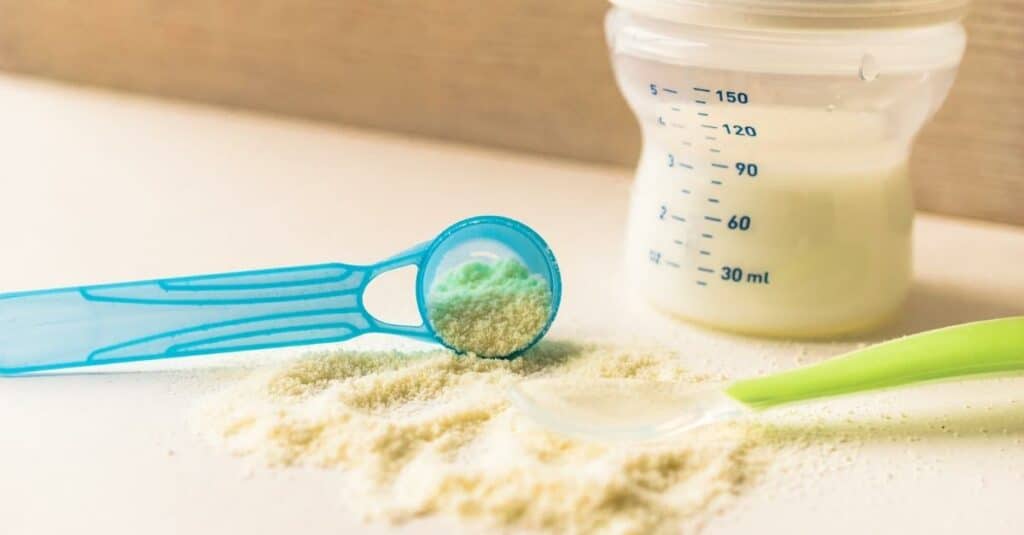
As your baby grows and develops, the time eventually comes to transfer from milk to soft foods. At this time, many parents find themselves wondering which kind of cereal will be the most beneficial for their babies.
Of course, choosing the right food for your baby is incredibly important. After all, the food that you choose will be instrumental in ensuring that your baby grows up healthy and strong with no deficiency-related health conditions.
Because your baby is in a fundamental stage of growth and development, not providing them with the right nutrients can have a long-term impact on their health and growth.
One of the biggest baby food debates is whether oatmeal or rice cereal is better for infants. This is a question we are going to explore in detail in this article.
Make sure to stay tuned until the very end because we’re also going to be answering some of the most frequently asked questions about rice cereal vs oatmeal cereal!
What’s The Difference Between Oatmeal And Rice Cereal?
Many parents have a difficult time choosing between oatmeal cereal and rice cereal when it comes to their babies’ diets because, although there are some similarities, there are also some very important differences.
So what exactly makes these two cereals so different? Of course, the first crucial difference between these cereal types is that oatmeal cereal is made of oats while rice cereal is made from – you guessed it – rice grains.
The flavor of oatmeal cereal is also different from rice cereal. Oatmeal cereal has a nutty flavor, while rice cereal doesn’t have much flavor to it at all.
There is also a third key difference between these cereals: the allergy risk. Oatmeal may cause allergies in some babies, whereas the risk is much lower with rice cereal.
From these differences alone, you may already have a good idea of what kind of cereal you’d like to introduce into your baby’s diet.
However, we recommend that you keep reading until the end of the article because we would like to talk about the specific benefits of rice cereal vs oatmeal cereal, including nutritional profiles, top brands, overall pros and cons, and the opinions of parents.
Is Rice Cereal Or Oatmeal Cereal Better For Your Baby?
There are many factors that should be considered when buying food for your baby, from practicality to costs.
However, what we’re mainly going to be focusing on in this section is whether oatmeal or rice cereal is better for your baby in terms of nutrition.
For more answers about the differences and similarities between rice and oatmeal cereal, keep reading until the end to see our FAQ section!
Rice Cereal
Rice cereal is one of the oldest forms of infant feeding available today. It was originally used as a way to feed babies who had trouble digesting other foods.
It’s important to note that just like there are different types of rice (primarily white and brown rice), there are different types of rice cereal.
Both have benefits – for example, both are full of energy. However, if you choose to give your baby brown rice cereal, they will experience more energy-boosting benefits.
Many parents choose rice cereal as a transition food because of its smooth texture. Because rice cereal is free from the grittiness that is present in many other cereal types, it’s close to the smooth texture of milk.
This makes it easier for babies to get used to eating cereal because it doesn’t feel like a drastic change from their usual diets.
Due to the textural similarity between rice cereal and milk, it’s also easy to mix rice cereal with milk if your baby is still struggling to eat rice cereal by itself.
Rice cereal is a great option for babies who don’t tolerate other cereals well. It is one of the best options if your baby has an intolerance to wheat, gluten, dairy, eggs, nuts, soy, corn, or any other ingredient because it doesn’t have much of an allergy risk, unlike oats.
However, rice cereal does contain some ingredients that may not be beneficial for your little one. One such ingredient, which is the main source of concern for most parents, is arsenic.
Rice cereals from all brands contain small amounts of arsenic, and for adults, these quantities are not large enough to cause any problems.
However, the issue is that arsenic is present in brands of rice cereal manufactured specifically for babies.
Babies are, of course, much smaller than adults, so even the tiny amounts of arsenic in rice cereal can potentially be damaging under certain conditions.
Constipation and allergic reactions are common side effects of arsenic consumption, so if you choose to feed your baby rice cereal, it’s important to be on the lookout for these symptoms.
While rice cereal comes with a lower overall allergy risk compared to oatmeal cereal (see below), the potential complications from arsenic consumption mean that it’s not a good idea to feed your baby too much rice cereal for too long.
It’s best used in small quantities and for a short period of time while your baby gets used to soft solids.
The Best Rice Cereals For Babies
Curious about which rice cereal brands you should consider buying for your baby? According to popularity and buyer testimonials, the best rice cereals for babies are:
- Holle Organic Rice Cereal
- Gerber DHA and Probiotic Single-Grain Rice Baby Cereal
- Happy Family Happy Bellies Brown Rice Baby Cereal
Rice Cereal Nutritional Information
- Rice cereal contains 45% of an infant’s daily iron requirement
- High in protein for growth and repair
- Contains several B vitamins for energy and neurological function
- Rice cereal contains a lot of energy
- Can be mixed with breast milk for added nutritional benefits
- High calcium carbonate content for building strong bones
Pros and Cons
Pros
- Gluten-free, so there is a low risk of allergies
- Easy-to-mix texture for convenient feedings
- Easily digestible
- Smooth texture makes milk-to-solids transition easier
- Plain taste that isn’t too different from breast milk
Cons
- Contains arsenic, which can cause constipation and allergies
- Some babies might not enjoy the plain taste
Parents Weigh In
Before you buy one of the brands of rice cereal listed above, you should know what other parents are saying about the benefits of rice cereal for infants. Personal testimonies from satisfied parents include:
- Parents appreciate the smooth texture of rice cereal, which makes the cereal much more palatable for most babies, as well as making it easier to mix the cereal into milk and other foods for more nutritional benefits and easier transition.
- Multi-grain rice cereal, according to one reviewer who gave rice cereal a 5-star review, has helped to keep their baby’s digestive system healthier, resulting in more regular bowel movements.
- Because rice cereal is so smooth, many parents who have reviewed this type of cereal find that they can put it directly into their baby’s bottle to make feeding time easier.
- Parents have reported that rice cereal is very filling and helps their babies to feel full for longer than milk alone, which leads to better nights’ sleep.
Oatmeal Cereal
Oats are a great staple food to introduce into your baby’s diet, which is why so many parents choose oatmeal cereal when it’s time for their babies to transition from milk to solids.
In fact, according to the American Academy of Pediatrics (AAP), oatmeal is one of the best cereals for babies.
According to the AAP, oatmeal provides a balanced nutrition profile, which includes high amounts of fiber, iron, calcium, zinc, vitamin B6, folate, magnesium, phosphorus, potassium, copper, manganese, and selenium.
It also contains a low amount of saturated fat. These nutrients help support healthy growth and development during infancy.
One of the most important nutrients for your baby during the early stages of their development is iron. Iron helps the body produce red blood cells, which carry oxygen throughout the body.
If there isn’t enough iron in the body, then babies can become weak and tired easily. Iron deficiency can lead to anemia, which is a condition that can significantly impact your baby’s health.
Luckily, just a quarter of a cup of oatmeal cereal can provide up to 80% of your baby’s daily recommended iron intake, so if you choose to incorporate oats into your baby’s diet, you’ll be taking an important step towards protecting their health.
If you have a very hungry baby on your hands, oatmeal might be your best option because the consistency is pretty thick, so it’s filling and will tide your baby over until their next meal.
Other benefits of oatmeal cereal for babies include the fact that infants often enjoy the flavor, which encourages them to eat the recommended amount of cereal per day.
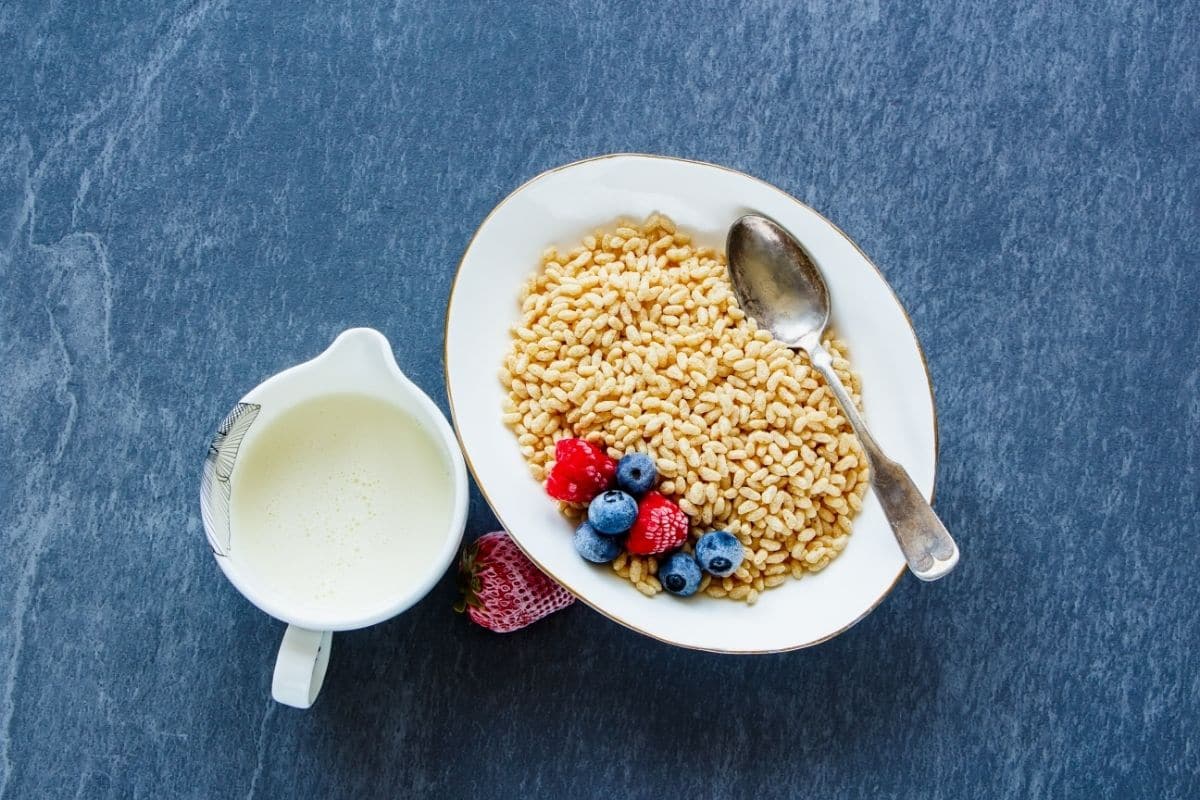
Additionally, because oatmeal cereals are high in fiber, consuming this cereal is likely to ease your baby’s digestion and minimize common issues such as constipation.
Another great thing about oatmeal cereal is that you don’t need to buy it pre-prepared. In fact, it’s probably cheaper to make it yourself, and it’s really easy!
Just get some steel-cut oats and cook them overnight in a crockpot. Make sure you don’t get genetically modified oats, though, since there are much better, healthier options on the market for your baby.
Unfortunately, there is one thing that stops some parents from buying oatmeal cereal for their babies, and that’s the fact that oatmeal cereals contain gluten.
This means that babies with celiac disease or wheat allergies cannot consume oatmeal cereal without experiencing symptoms.
If you’re wondering how to know whether your baby has a wheat allergy, there are some symptoms to look out for. Itchy or inflamed skin, including hives, can be a sign of wheat intolerance in babies.
So can irritated eyes, difficulty breathing, vomiting, diarrhea, and rarely, anaphylaxis.
If you notice any of these symptoms in your baby, particularly after consuming oats or other foods containing gluten, it’s best to take them to the doctor for blood tests.
In the meantime, it’s a good idea to avoid foods that have gluten in them, including oatmeal cereal.
Of course, if any of the more extreme symptoms arise, such as difficulty breathing, you should seek emergency medical care.
The Best Oatmeal Cereals For Babies
There’s a lot to consider when it comes to oatmeal cereal for infants, but if you feel from the information provided above that it’s the best choice for your baby, the next step is to choose the best brand to meet your baby’s nutritional needs.
The best oatmeal cereals for babies are:
- Beech-Nut Complete Stage 1 Oatmeal Cereal
- Holle Organic Oatmeal Porridge Rolled Oats Cereal
- Happy Baby Organic Oatmeal Cereal
- Oatmeal Gerber Cereal
Oatmeal Cereal Nutritional Information
We’ve covered some nutritional highlights of oatmeal cereal already, but if you were looking for a quick, comprehensive summary of the benefits and drawbacks of oatmeal cereal for babies from a nutritional perspective, here it is!
- There is a lot of energy in oatmeal to support growth
- High fiber content makes for easier digestion
- Mineral content improves bone health and brain function
- There are plenty of vitamins in oatmeal cereal for healthy growth
- Mild risk of allergic reactions as a result of oatmeal cereal’s gluten content
Pros and Cons
Pros
- Enjoyable, mildly nutty flavor
- Easily digestible due to fiber
- Simple to prepare
- Ideal for teaching infants to swallow
- Has been shown to minimize acid reflux by helping to keep milk down
Cons
- Not always suitable for gluten-intolerant babies
Parents Weigh In
You’ve heard what we and nutritional experts think about oatmeal cereal for babies, but some of the most important testimonies on this type of cereal come from other parents!
Here are some of the most positive opinions parents buying through online retailers had to share about their experiences with oatmeal cereal for babies:
- We found a review that shared how one parent’s baby began to sleep better throughout the night due to feeling fuller and more satisfied after oatmeal cereal was introduced to their diet.
- Several reviews recommended mixing oatmeal cereal with other nutritious foods such as banana and apple purée for a flavor and nutrient boost.
- Parents whose babies had frequently suffered from constipation prior to being fed oatmeal cereal reported that their infants’ digestive systems seemed much healthier after they started their oatmeal cereal diet.
- It’s also worth noting that many parents favorably compared oatmeal cereal to rice cereal, saying that their babies didn’t like the rice cereal they started them on but preferred and really enjoyed oatmeal cereal.
Frequently Asked Questions
- How Do I Know My Baby Is Ready To Switch To Cereal?It depends on how old your baby is, but generally speaking, they should start transitioning to solid foods at between 4 and 6 months old. The reason this age is considered the "golden" age for introducing new foods is that it gives your baby's digestive system a chance to mature before trying new things. This means that your baby won't experience as many stomachaches or diarrhea while eating new foods. Additionally, by this age, your baby should be able to hold up their head, which means that swallowing non-liquid food doesn't come with such a high risk of choking. Of course, not all babies develop at the same rate, so it's possible that your baby could be ready for cereal earlier or later than the estimated transition age. Instead of rigidly adhering to recommended ages, you should pay attention to signs of physical development in your child. Good signs that your baby might be ready to start eating cereal are that they are developing good coordination surrounding food (e.g. being able to interact with food by looking and touching) as well as being able to swallow.
- Is There Arsenic In Earth's Best Organic Rice Cereal?Yes, there is arsenic in Earth's Best Organic Rice Cereal. However, the arsenic levels in this cereal are low compared to those found in previous tests of other infant rice cereals. There is approximately 66.4 ppb of arsenic in this rice cereal brand. It is important to remember, however, that recent research has found arsenic in all brands of rice cereal manufactured for infants.
- Can You Put Cereal In A Baby Bottle?It is best not to add cereal to the milk in your baby's bottle. Although this may seem like a good way to facilitate the food transition process, it can actually increase your baby's risk of choking. It is best to spoon-feed your baby cereal separately from milk feedings when they reach the age of 4 to 6 months.
- Does Rice Cereal Contain Gluten?Rice contains no gluten, so rice cereal for babies does not contain gluten. This is one of the reasons why rice cereal is considered to be safer than oatmeal cereal in terms of allergy risks because gluten intolerance is one of the most common food intolerances in both babies and adults.
- How Many Times Daily Should Babies Eat Cereal?This varies depending on your baby's age and nutritional needs. Generally speaking, babies who are older than 1 year old should have 2 servings of cereal per day. If your baby is younger than 1 year old, then it's best to stick to between 1 and 4 tablespoons of cereal once or twice a day.
- Can I Give My Baby Cereal At 3 Months Old?Experts in infant development do not recommend giving a baby under the age of 4 to 6 months cereal. Usually, it is recommended to wait until your baby is 6 months old before you start feeding them cereal. If your baby develops a little faster, it is okay to start feeding cereal at 4 months, hence the 2 - month window estimated by nutritional experts. However, in the vast majority of cases, 3 months is too young to start transitioning to solid foods. This is because their stomachs and swallowing reflexes may not be ready for soft food yet, and they don't yet need the zinc and iron provided by solid food.
- What Happens If I Feed My Baby Rice Cereal Too Early?Just as there can be consequences for not feeding your baby solid food when they reach the age where they should be transitioning from an all-milk diet, you will probably notice negative effects if you start feeding rice cereal to your child too early. Chronic diseases can develop if you start feeding soft foods like rice cereal before the recommended age. This is because the addition of soft foods means they won't be able to consume as much milk as they need, leading to deficiencies in certain nutrients. Eczema, celiac disease, and diabetes can all result from feeding rice cereal and other solid foods too early.
- What Are Some Substitutes For Infant Rice Cereal?If you were considering feeding your baby rice cereal but have had second thoughts due to this cereal's arsenic content, you'll be pleased to learn that there are several alternatives that you can give to your baby instead. Of course, you can feed your baby oatmeal cereal instead of rice cereal, but you can also use buckwheat cereal, almond cereal, quinoa cereal, multigrain cereal, and barley cereal as substitutes for rice cereal.
- What Time Of Day Should I Give My Baby Rice Cereal?There is no definitive time of day that is recommended for feeding your baby rice cereal. However, if you are feeding your baby rice cereal at the same time as breastfeeding, it makes logical sense to schedule your rice cereal feedings when your milk supply is lowest. This gives your supply time to build up again and ensures that your baby has a nutritious meal during this time. Most breastfeeding parents find that their milk supply is lowest in the late afternoon or evening. However, because rice cereal contains a lot of energy, you might feel it's best to give your baby this type of cereal for breakfast instead of in the evening. Ultimately, it's all about what works for you.
- Do Babies Drink Less Milk After Starting Cereals?As your baby consumes more solid foods, like oatmeal or rice cereal, they will naturally begin to drink less milk. This is why it's so important not to start the transition onto solid foods too early, as you will be encouraging your baby to drink less milk when they still need the nutrient content of milk for healthy growth and development.
- What Foods Can I Mix With Cereals For Infants?Good food choices for mixing with cereal for infants include bananas, pears, apricots, applesauce, peaches, berries, and avocados. Try out these different foods to see what your baby likes and try to feed a range of nutrients.
Final Thoughts
Oatmeal cereal and rice cereal can both be good soft food choices for when it’s time to transition your baby from an all-milk diet to a solid food diet.
However, they don’t have all the same nutritional benefits, and each presents its own risk of side effects that parents should be aware of before introducing either cereal into their babies’ diets.
Both rice cereal and oatmeal cereal contain lots of energy, with brown rice cereal being the highest in energy compared to white rice.
Oatmeal cereal contains more vitamins and minerals than rice cereal, which is the main reason why many parents favor this type of cereal.
However, oatmeal cereal may contain gluten, meaning that gluten-intolerant infants will either need a gluten-free brand of oatmeal cereal or a different type of cereal altogether.
With that being said, all brands of rice cereal, including rice cereal for babies, contain arsenic. The arsenic is only present in small quantities, but given the tiny size of your average baby, negative side effects such as allergies and constipation can occur.
Both rice cereal and oatmeal cereal are easy to digest. Oatmeal cereal contains the most fiber, so it’s the best choice if your baby frequently suffers from constipation.
However, rice cereal is the closest to plain milk in terms of texture, so your baby might find it easier to eat at the beginning of the transition period.
Rice cereal has a plainer, less noticeable flavor than oatmeal cereal. While oatmeal cereal doesn’t have a strong flavor, it is mildly nutty.
Both cereal types can be mixed with fruit purées such as mashed bananas to enhance flavor and nutritional value. The plain flavor of rice cereal can even be a benefit because it blends into milk easily for a less jarring transition period.
Overall, there are benefits to both of these types of cereal, but choosing the best cereal type for your baby will involve taking into consideration your child’s general health, including any current health issues.
You might also decide to choose one type of cereal and then try the other, depending on your baby’s flavor preferences and digestive responses.

Carly Link, a 33-year old mother of two toddlers. She is a parent and goes through a lot of the usual parenting difficulties herself. Carly shares all her experiences and knowledge about the best baby products through this blog.

